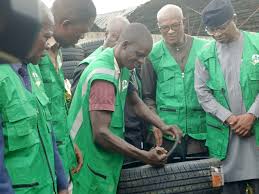The Standards Organisation of Nigeria (SON) has destroyed a massive haul of imported substandard goods, including tyres, steel doors, and spark plugs—items collectively valued in the billions of naira. The destruction exercise, which took place on April 29 in Lagos, marks another major move in SON’s ongoing campaign to eliminate unsafe products from the Nigerian market.
According to SON, the seized items were intercepted at the country’s entry points before they could reach consumers. Deemed hazardous and unfit for use, the products posed serious threats to public safety and national security.
The event was witnessed by representatives from key regulatory and security bodies, including the Nigeria Customs Service (NCS), Nigeria Police Force, Nigeria Security and Civil Defence Corps (NSCDC), trade associations, and import stakeholders.
Dr. Ifeanyi Chukwunonso Okeke, Director-General and Chief Executive of SON—represented by his Special Assistant for Strategic Support, Manji Pious Lawan—emphasised the gravity of the situation. He stated that the products failed to meet Nigeria’s minimum safety and quality standards and, if allowed into circulation, could result in loss of life, property damage, and broader economic consequences.
“Substandard tyres can lead to deadly road accidents, poor-quality steel doors compromise home and business security, and faulty spark plugs can cause critical engine failures,” Okeke said. “Today’s destruction is a clear message: SON will not allow dangerous goods to endanger Nigerian lives.”
He further revealed that several arrests had been made, with some suspects already facing prosecution while other cases remain in court. He described the action as part of a broader strategy to purge the market of fake and uncertified goods.
Okeke stressed that SON’s operations are guided by its mandate under the SON Act No. 14 of 2015, which authorizes the agency to enforce compliance with national quality standards and eliminate harmful products from circulation.
He issued a strong warning to manufacturers, importers, and traders: compliance is not optional. “We will continue to identify, seize, and destroy substandard goods wherever they are found—and hold those behind them accountable,” he added.




